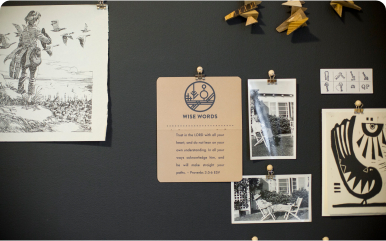April 24, 2015
How I Learned to Stop Worrying and Love My God

[intro]Therefore do not be anxious about tomorrow, for tomorrow will be anxious for itself. Sufficient for the day is its own trouble. — Matthew 6:34[/intro]
A friend and I recently chatted about a few major life changes that were causing him some stress. As I reminded him of the various passages on worry—Matthew 6:25-34, Romans 8:28—I found myself wishing I had something more immediately practical to say.
It’s a common trend, isn’t it? We hear plenty of sermons and adages telling us not to worry, but very little practical advice on how to stop worrying. These quotes don’t exactly help us when we’re lying awake at 3 a.m., worrying about that big meeting, or that test, or that health scare, or that debt. Even presupposing we’ve prepared, or studied, or taken care of our bodies, or created a budget, we still panic when things come our way.
So how do we stop worrying? (Trust me, listening to that Bobby McFerrin song on repeat won’t help.)
The Key Problem: A Lack of Faith
Before we can address the “how,” it helps to understand why we worry. For most of us, I suspect it’s fairly simple: we do not understand the power and the sovereignty of God.
We’re in good company. The Bible is replete with examples of men who directly interacted with God and still had doubt. Take Gideon, in Judges 6. He was directly visited by the angel of the Lord and given instructions on how to confront and defeat the oppressive Midianites, and he still tested God—twice—by laying out a fleece and asking God for a miraculous sign as proof that God would give him victory. In Mark 9, the father of a demon-possessed boy expressed his doubt of Jesus’ power to his face. And in John 20, “Doubting” Thomas refused to believe the testimony of the other disciples that Jesus had come back to life, as Jesus himself had foretold.
Notice that there are two aspects to this unbelief. In the case of the father and of Thomas, there’s the doubt that Jesus could have such power. In all three cases, and especially Gideon’s, there’s a significant doubt that God would do what he said.
Some of us fall in that first camp. This may be especially true for those who are new to faith, or have yet to come to faith. We may have a basic understanding of God’s theoretical power, but we have a hard time actually comprehending that ours is a God who had (and has) the power to create the universe—who had (and has) the power to bring back more than one rotting corpse from the grave, including his own.
Nearly all of us, I suspect, fall in the second camp. Regardless of how much we believe that God can move in our lives to “work all things together for the good of those who love God” (Romans 8:28), we doubt that he will. I personally often to fail to reconcile the knowledge that my stupidity has consequences with the truth that God is faithful in spite of my own often-idiotic choices. (One immediate and rather ironic example: I got a late start on the draft of this blog post as a result of my own poor time management, and then lost sleep due to insomnia, worrying about whether I’d make my own arbitrary deadline for it.)
The truth, of course, is that when the Bible tells us that God works all things together for the good of those who love him, it means that God works all things together for the good of those who love him. And therefore, we should stop worrying about it. Granted, in the cases of our own failures and stupidity, the “good” may come in the form of painful discipline which will eventually result in “the peaceful fruit of righteousness” (Hebrews 12:11). But “He who began a good work in you will be faithful to complete it” (Philippians 1:6), and therefore we can trust God when he says he will take care of us. We truly have no reason to be anxious.
This leads us back to the original question: We know why we should stop worrying. So how exactly are we supposed to do that?
1. Get Closer to Jesus
Think about your closest friends for a moment. Hopefully we all have one or two people who we trust implicitly—who know many of our secrets, and who we know would come help us out if we needed it. Why do we trust those people? Not just because our third grade Sunday School teacher told us to, that’s for sure. No—we spent time with those people. We hung out and talked a lot. They proved themselves trustworthy, so we trusted them more and more.
It’s exactly the same thing with trusting God. If we want to trust him when he promises to supply all our needs (Philippians 4:19), then we need to get to know him, and understand that he is trustworthy.
There are a few ways to do this. Arguably, the most important way is to build a daily habit of reading the Bible and praying. John calls Jesus “the Word made flesh” (John 1:14), so by extension, the Bible is as close as we can get to Jesus in printed form. It was God-breathed (2 Timothy 3:16), it is God speaking to us, and by reading the Bible, we’re listening to him. (Check out this blog post for tips on starting a daily Bible study habit.)
Part of building trust with someone means sharing our own secrets. Prayer, then, is another key component. It’s us holding up our end of the conversation. And, of course, there are other important spiritual disciplines, like attending church regularly and getting involved in a Life Group.
The point of all of these spiritual disciplines is to draw closer to God—to follow a living God who keeps his promises. When we understand that God’s sovereign faithfulness extends to our daily lives, our worry will start to diminish. The closer we are to God, the less anxiety will rule over us.
2. Remember God’s Provision
One of the marvelous things about the Bible is how utterly repetitive it can get, especially in the Old Testament.
I’m not being sarcastic. Starting in Exodus (if not before), the Israelites experience God’s faithfulness, and then the prophets remind them of what God has done. Exodus 19 sees the Israelites camping, only 3 months after leavig Egypt; God tells Moses to remind the people of how God had punished the Egyptians and brought them out of the foreign country. This is a recurring theme: Remember how God has rescued you! No, really, stop worrying, Israel! God brought you out of way worse straits! Seriously. Stop worrying and remember what God has done. In fact, here, let’s set up an annual festival—the Passover feast, established in Exodus 13—to remind you of how God has rescued you.
Remembering God’s faithfulness is key to killing worry. We don’t even have to look back as far as Exodus, several millennia ago, to see evidence of God at work. In my own life, for example, I can look back at all the times my previous junk heap of a car broke down and pinpoint exactly how God provided for me and protected me. The real trick is to look back at rough circumstances and recognize and acknowledge God’s blessings in them. The Israelites were trapped between the sea and the Egyptian army; God parted the waters, then used those same waters to drown the Egyptians (Exodus 14). My car blew a gasket late one night in Battle Creek; God made sure several other cars full of friends were at the same event to keep me company on the rural road while we waited for the tow truck and give me a ride back to Lansing. One of these things has more historical significance than the other, but both are proof that God takes care of his kids. So why should I worry? His provision isn’t always obvious, and it certainly isn’t always what I want. But God has said he won’t leave or forsake me (Deuteronomy 31:6), and he hasn’t failed me yet.
Taking time when you’re struggling with worry to remember all the times in the past that God has cared for you will help you remember that he will continue to care for you in your current crisis.
3. Become Part of God’s Provision
Once we understand God’s provision and generosity, a natural response is to respond in kind. The early church got this. The earliest members of the brand-new church famously sold off everything they had and distributed it to the needy (Acts 2:45). They didn’t worry about their daily bread; they were breaking it and sharing it together. They understood that everything they owned was a blessing from God and should be used to share God’s blessing.
To be clear, I’m not saying we shouldn’t enjoy what we have. But especially during those worry-free periods, we need to remember that everything we have is a gift, and we can use it all to help show the faithfulness of God to those around us. For example, in the pre-cell phone days, I took rides from strangers more than once when my junk-heap car with rear-wheel drive had, uhm, “off-road adventures” in winter. Over a decade later, I was able to reciprocate the kindness of strangers (and God’s provision and protection) in giving a ride to a young woman who had run out of gas in the middle of nowhere. I mention these not as specific life choices to emulate, but I was grateful for God’s provision in the past and glad to provide relief for someone in similar circumstances.
That’s one of the amazing things about God, you see. He lets us step in and help reveal Himself to those around us—through chance interactions, or through intentional acts, like the Compassion needs board.
God certainly doesn’t need our help, but he desires it. Remember the book of Esther? The Jewish queen of Persia had the opportunity to prevent the systematic slaughter of her people (a cause for worry if there ever was one), but at potential great risk to herself. So why do it? As her cousin Mordecai told her, Esther didn’t need to be the one to take action—God was going to provide salvation regardless:
And who knows whether you have not come to the kingdom for such a time as this? — Esther 4:14
When we, like Esther, step forward and take action, we get to experience the blessings of God in a new way. And the more we participate in his blessings, the more we understand the nature of God’s provision.
So how do we kill worry? By drawing close to God. Taste and see that God is good (Psalm 34:8). Slowly but surely, the tendency to worry will just die off on its own.
Image Credit: Emergency Brake
Quick Links
- Connect
- Prayer
- Give
- Life Group Material
- Serve





























